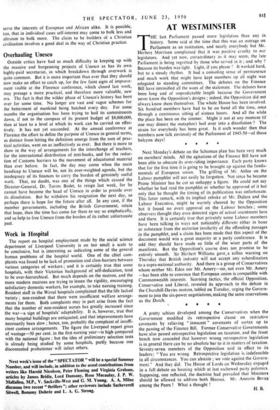AT WESTMINSTER
THE last Parliament passed more legislation than any in history. Some said at the time that this was an outrage on Parliament as an institution, and nearly everybody but Mr. Herbert Morrison complained that it was positive cruelty to our legislators. And yet now, extraordinary as it may seem, the late Parliament is being -regretted by those who served in it ; and why ? Because its burden was light. Light, if you please ! It worked hard, but to a steady rhythm. It had a consoling sense of permanence and much work that might have kept members up all night was relegated to standing committees. The debates on the Finance Bill have intensified all the woes of the stalemate. The debates have been long and of unpredictable length because the Government never know the Opposition's designs ; indeed, the Opposition did not always know them themselves. The whole House has been involved. Six hundred members have had to be on hand all the time, once through a continuous sitting of sixteen hours. And all the while the place has been on the simmer. Might it not at any moment (if one may distort the metaphor) boil over into a dissolution ? The strain for everybody has been great. Is it such wonder then that members now talk enviously of the Parliament of 1945-50—of those halcyon days!
Next Monday's debate on the Schuman plan has been very much on members' minds. All the agitations of the Finance Bill have not been able to obscure its over-riding importance. Each party knows that for the first time it is going to be brought up against the funda- mentals of European union. The grilling of Mr. Attlee on the Labour pamphlet will not easily be forgotten. Not since he became Prime Minister has he cut so unhappy a figure. He could not say whether he had read the pamphlet or whether he approved of it but only that he thought the timing of its publication was unfortunate. This latter remark, with its implied rebuke of Mr. Dalton and the Labour Executive, might be warmly cheered by the Opposition but it found no overt approval on the Labour benches ; some observers thought they even detected signs of actual resentment here and there. It is certainly true that privately some Labour members have been talking in ways not noticeably different either in bone or substance from the sectarian insularity of the offending passages in the pamphlet, and a claim has been made that this aspect of the document would win a great majority at a party conference. It is odd they should have made so little of the wiser parts of the manifesto. But the Opposition's course does not promise to be entirely smooth. Sir Herbert Williams gave, a sullen warning on Thursday that British industry will not accept any subordination to a supra-national authority. And there is a group of Conservatives whom neither Mr. Eden nor Mr. Amery—no, not even Mr. Amery —has been able to convince that European union is compatible with Commonwealth interests. Scorning tactics, the official Opposition, Conservative and Liberal, revealed its approach to the debate in the Churchill-Davies motion, tabled on Tuesday, urging the Govern- ment to join the six-power negotiations, making the same reservations as the Dutch.
* * * * A pretty schism developed among the Conservatives when the Government modified its retrospective clause on restrictive covenants by relieving " innocent " covenants of surtax up to the passing of the Finance Bill. Former Conservative Governments have also passed retrospective legislation on taxation, and the front bench now conceded that however wrong retrospective legislation is in general there can be no absolute bar to it in matters of taxation. Seventy-seven members of the Opposition said in effect to its leaders: "You are wrong. Retrospective legislation is indefensible in all circumstances. You can abstain ; we vote against the Govern- ment." And they did. The House of Lords on Wednesday engaged in a full debate on housing which at last eschewed party polemics. Supposing, one reflected, the doctrine had prevailed that Ministers should be allowed to address both Houses. Mr. Aneurin Bevan among the Peers ! What a thought !
H. B.


































 Previous page
Previous page